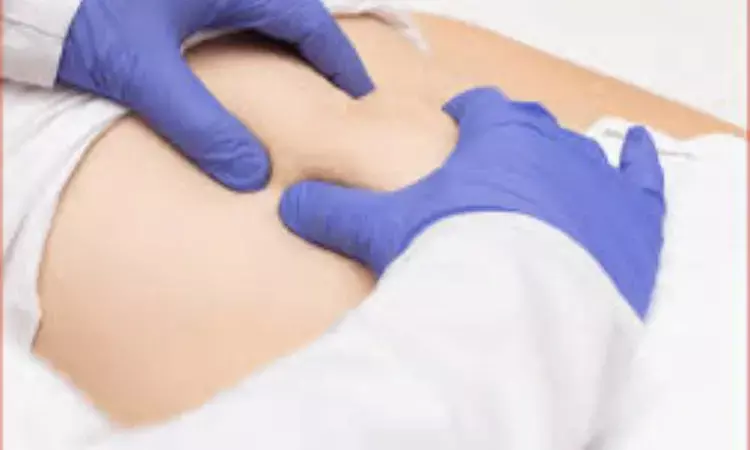- Home
- Medical news & Guidelines
- Anesthesiology
- Cardiology and CTVS
- Critical Care
- Dentistry
- Dermatology
- Diabetes and Endocrinology
- ENT
- Gastroenterology
- Medicine
- Nephrology
- Neurology
- Obstretics-Gynaecology
- Oncology
- Ophthalmology
- Orthopaedics
- Pediatrics-Neonatology
- Psychiatry
- Pulmonology
- Radiology
- Surgery
- Urology
- Laboratory Medicine
- Diet
- Nursing
- Paramedical
- Physiotherapy
- Health news
- Fact Check
- Bone Health Fact Check
- Brain Health Fact Check
- Cancer Related Fact Check
- Child Care Fact Check
- Dental and oral health fact check
- Diabetes and metabolic health fact check
- Diet and Nutrition Fact Check
- Eye and ENT Care Fact Check
- Fitness fact check
- Gut health fact check
- Heart health fact check
- Kidney health fact check
- Medical education fact check
- Men's health fact check
- Respiratory fact check
- Skin and hair care fact check
- Vaccine and Immunization fact check
- Women's health fact check
- AYUSH
- State News
- Andaman and Nicobar Islands
- Andhra Pradesh
- Arunachal Pradesh
- Assam
- Bihar
- Chandigarh
- Chattisgarh
- Dadra and Nagar Haveli
- Daman and Diu
- Delhi
- Goa
- Gujarat
- Haryana
- Himachal Pradesh
- Jammu & Kashmir
- Jharkhand
- Karnataka
- Kerala
- Ladakh
- Lakshadweep
- Madhya Pradesh
- Maharashtra
- Manipur
- Meghalaya
- Mizoram
- Nagaland
- Odisha
- Puducherry
- Punjab
- Rajasthan
- Sikkim
- Tamil Nadu
- Telangana
- Tripura
- Uttar Pradesh
- Uttrakhand
- West Bengal
- Medical Education
- Industry
Open Retromuscular Sugarbaker vs Keyhole Mesh Placement for Parastomal Hernia Repair Unveils Surprising Results

USA: Parastomal hernias, a common complication of stoma formation, often pose a significant challenge to patients and surgeons. In a groundbreaking development, a recent randomized clinical trial (RCT) has compared two distinct approaches to parastomal hernia repair: Open Retromuscular Sugarbaker and Keyhole Mesh Placement. The results of this trial promise to redefine the standard of care for this complex condition.
The randomized clinical trial revealed that the open retromuscular Sugarbaker mesh placement technique is not superior to the keyhole technique concerning 2-year parastomal hernia recurrence.
"Using either retromuscular mesh placement technique based on patient anatomy and surgeon expertise is reasonable," the researchers wrote in JAMA Surgery.
Parastomal hernias, a common complication following stoma formation, present a significant challenge in clinical practice. These hernias occur when abdominal contents protrude through the abdominal wall defect created during stoma creation, leading to discomfort, bowel obstruction, and other complications. Given the prevalence and clinical impact of parastomal hernias, it is paramount to identify the most effective surgical approach.
The Open Retromuscular Sugarbaker technique has long been the gold standard for parastomal hernia repair. It involves creating a pocket in the retrorectus space, reinforcing the abdominal wall with mesh, and then repositioning the stoma. In contrast, Keyhole Mesh Placement is a minimally invasive technique where a mesh is placed intraperitoneally through small incisions, to provide durable support to the stoma site.
Durable parastomal hernia repair remains elusive. Evidence comparing the durability of the open retromuscular Sugarbaker and keyhole mesh configurations is limited. To fill this knowledge gap, Sara M. Maskal, Department of Surgery, Cleveland Clinic, Cleveland, Ohio, and colleagues aimed to determine if the open retromuscular Sugarbaker mesh placement technique would lower parastomal hernia recurrence rates.
For this purpose, the researchers conducted a single-center, randomized clinical trial enrolling 150 patients with a permanent stoma and associated parastomal hernia who were candidates for open retromuscular parastomal hernia repair.
Enrolled patients were randomized to receive either retromuscular Sugarbaker or keyhole synthetic mesh placement following an intraoperative assessment to determine the feasibility of either technique.
The primary outcome was recurrence of parastomal hernia at 2 years. Secondary outcomes included wound complications, mesh-related complications, reoperations, as well as abdominal wall–specific quality of life, patient-reported pain, stoma-specific quality of life, and decision regret at one year and two years.
The researchers reported the following findings:
- A total of 150 patients were randomized, and with 91% follow-up at 2 years, there were 17% parastomal hernia recurrences in the retromuscular Sugarbaker arm and 24% in the keyhole arm (adjusted risk difference, −0.029, and adjusted risk ratio, 0.87).
- There were no statistically significant differences between the Sugarbaker and keyhole groups regarding reoperations for recurrence (2 versus 7, respectively), stoma necrosis (1 versus 0, respectively), nonhernia intra-abdominal pathology (4 versus 10, respectively), mesh-related complications (4 versus 1, respectively), abdominal wall–specific quality of life, patient-reported pain, stoma-specific quality of life, and decision regret at any time point.
"In open parastomal hernia repair with retromuscular mesh, Sugarbaker mesh placement was not superior to a keyhole configuration at 2 years postoperatively," the researchers wrote, adding that "further innovation is necessary to improve outcomes in parastomal hernia repairs."
Reference:
Maskal SM, Ellis RC, Fafaj A, et al. Open Retromuscular Sugarbaker vs Keyhole Mesh Placement for Parastomal Hernia Repair: A Randomized Clinical Trial. JAMA Surg. Published online June 12, 2024. doi:10.1001/jamasurg.2024.1686
Dr Kamal Kant Kohli-MBBS, DTCD- a chest specialist with more than 30 years of practice and a flair for writing clinical articles, Dr Kamal Kant Kohli joined Medical Dialogues as a Chief Editor of Medical News. Besides writing articles, as an editor, he proofreads and verifies all the medical content published on Medical Dialogues including those coming from journals, studies,medical conferences,guidelines etc. Email: drkohli@medicaldialogues.in. Contact no. 011-43720751


